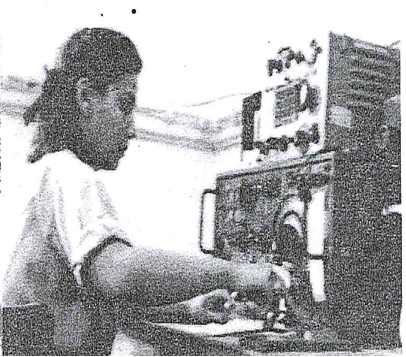
My parents were ardent Zionists and left Hartford, Conn. in 1933 to live in Palestine with two daughters. We lived in Hadera for six years and returned to the United States for a visit in August 1939. Hitler marched into Poland on 1st September, and we were stuck in the U.S.A. during the war years.
The first boat leaving for Palestine after the war was a converted troop ship called “Marine Shark.” She left New York on 8th June 1946 and arrived in Haifa on 22nd June. We were on it: we were now four children, the youngest nine-months-old. Also sailing on the boat were two other Americans, Moshe Brodetsky and Benjamin Steurman, who was called The Rov [Rabbi], probably because he had a beard.
The family returned to Hadera, but in September 1946 I moved to Tel Aviv and got a job with the Imperial Chemical Industries Levant Ltd. (ICI) in Salame Street, Jaffa/Tel Aviv. I shared a room with a girl in Kiryat Meyer and through her joined the Haganah in early 1947. In 1948, during the blockade of Jerusalem, I was sent to the Central Egged Bus Station in Tel Aviv to clean weapons from convoys returning from Jerusalem.
After the United Nations partitioned Palestine in November 1947, I signed up for “Part Time Army.” Early in 1948 I was attached to a Palmach unit that traveled with convoys to Jerusalem and Haifa. The British were still in the country, and the girls used to hide Sten guns and grenades under their coats; they were to give the weapons to their partners to use when needed. After the convoy duty, I was sent to Sarona in Tel Aviv for a three-day course on weapons.
After returning to work at ICI, I noticed that the city was emptying, friends disappearing. I spoke with a friend who was working with the Shin Bet in Haifa about contacting someone so that I could join a course. He spoke with Yochai Fishman Ben-Nun, head of the Palyam in Haifa. Later he became Commander in Chief of the Navy. We made an appointment and on the designated day I met Yochai at the Palyam office on King George Street. We drove to a street in Hadar Hacarmel and soon a fellow approached us. Yochai introduced me to Yossi Hashaman. I later discovered that his name was Rosenthal and that he was communication officer in Hativa 2 of Carmeli. He asked me one question – was I musical? I answered yes. I had sung for four years in the high school choir. He told me to go back to Tel Aviv and say nothing to anyone, and I should contact a fellow named Itzhak. I was to come with a suitcase and be ready to leave at once. At work, I asked for a leave of absence. I found Itzhak, and after talking with me he sent me to Kibbutz Shefayim.
Only after I arrived at the kibbutz did I find out that this was a Wireless Operating Course, and that I would be there for six weeks. Studies were intensive – 13 hours a day. We discovered that in the U.S. Army this course took 6 months. One day, I was surprised to see my sister Alice talking to our instructors. It turned out that she had no idea that I was taking the course, and I had no idea that she was a wireless operator. Because of the times, secrecy was a must.
I graduated on 11th May 1948 and was to report to Hativa 2 of the Carmeli Brigade in Haifa on 15th May. It was a historic moment, watching the last British soldier depart.
The station was on Shoshanat Hacarmel, but there were no accommodations for the people who were from Haifa or the surrounding towns. For a while I was given £21 per month for living expenses. I rented a room on Pevsner Street on the Hadar Hacarmel, and later on I just slept at the radio station.
We didn’t do basic training, and we never slept in camp. The problem with that arrangement was that we were not supplied with food and I had to pay my way through the army. I served for 18-months in Haifa as a wireless operator, as well as coding and decoding. For the last six months I was transferred to Eir Ganim and Tarshiha. I was discharged on 9th March 1950, after two years of service.
On 11th March 1950, I went down to Eilat to join “Operation Arava.” Its purpose was to build a road from Beersheba to Eilat. I remained there for six months and there I met my husband, Reuben Plen.
Source: Author, Sarah Marden Plen, AVI Newsletter December 1997

